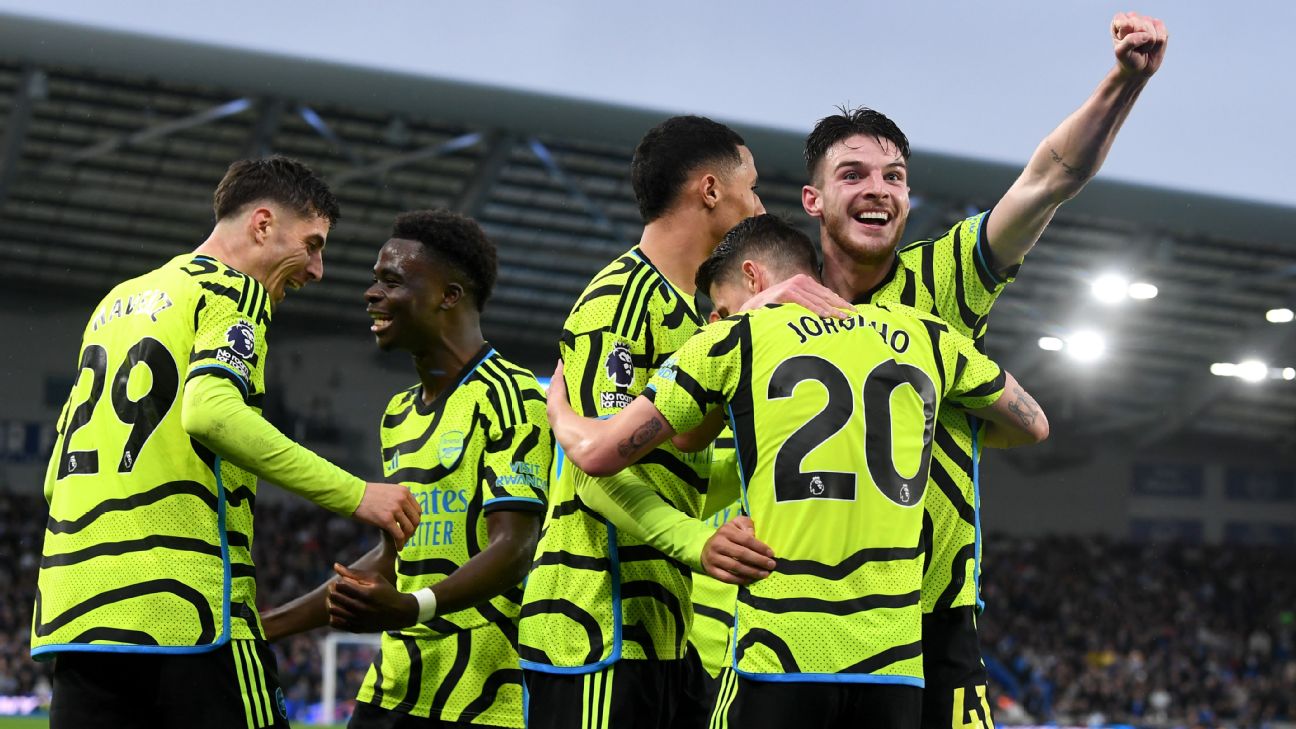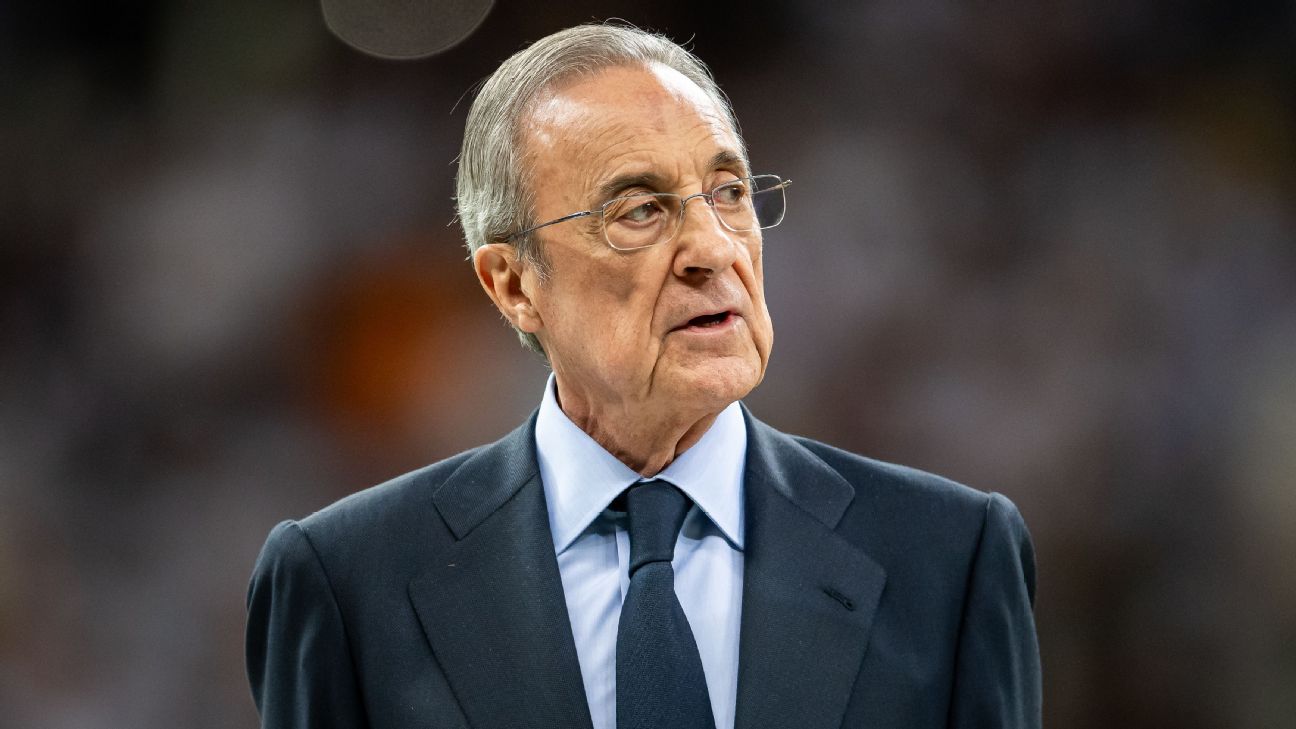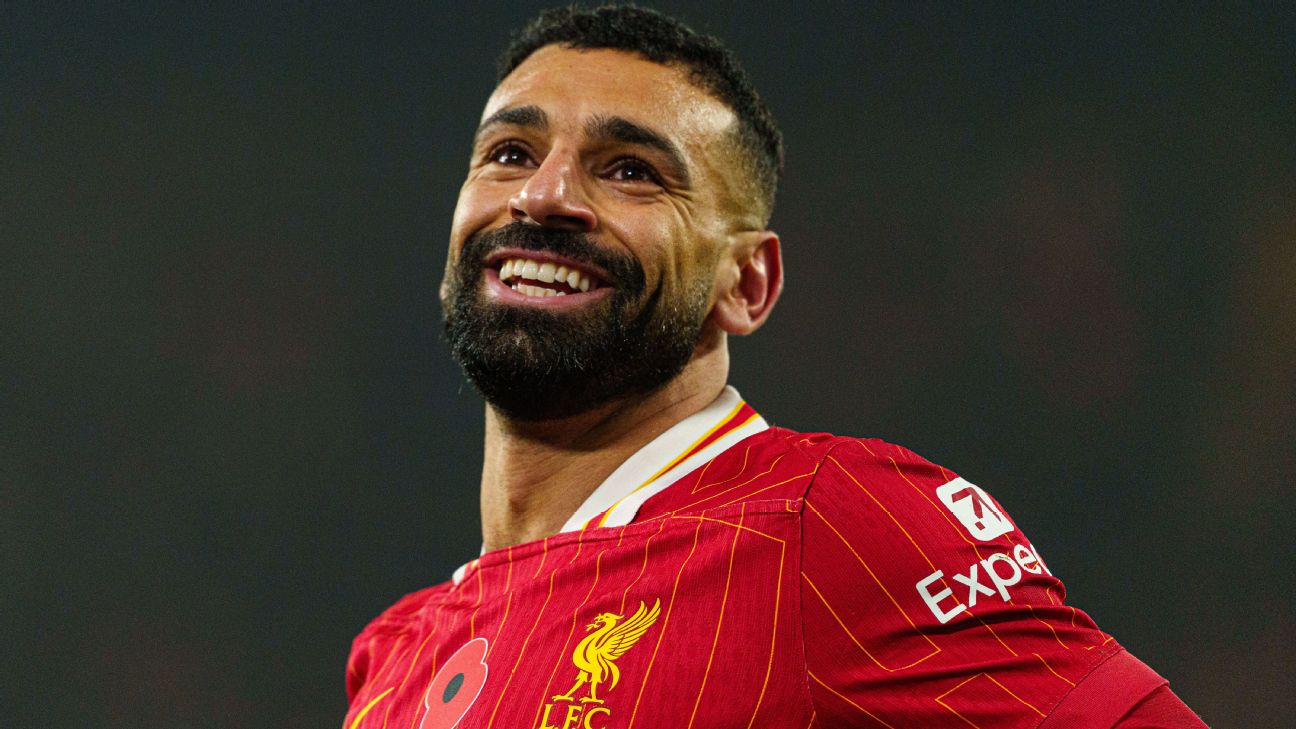The last Arsenal team to win the Premier League was, according to many, the greatest Premier League team of all time. They’re called “The Invincibles,” after all, and they did something that no other Premier League team has ever done. Or, rather, they didn’t do a thing that every other Premier League team has done: lose.
Led by Thierry Henry’s league-leading 30 goals and a league-low 26 goals conceded on the other end, Arsene Wenger’s team won 26 matches, drew 12 and lost none in 2003-04. They’re the only Premier League team to go undefeated over a full domestic season, and only two others have done it across Europe’s Big Five leagues during the sport’s modern era: AC Milan in 1991-92 and Juventus in 2011-12. In fact, only two other Premier League teams have even managed just a single loss: Chelsea in 2004-05 and Liverpool in 2018-19. All of Pep Guardiola’s Manchester City teams have lost at least two games.
The Invincibles were — and perhaps are — the iconic Premier League team. Henry cutting in from the left and just generally being the coolest person you’d ever seen; Robert Pires hunched over the ball, unable to lift his legs off the ground and still making it work; Gilberto Silva and Patrick Vieira gobbling up all the space and all the loose balls; Ashley Cole bombing forward and creating the modern full-back position; Jens Lehmann bordering on a nervous breakdown at all times in goal — to a certain generation of fans, which includes me, this team defined an era, defined a league.
The Invincibles might be the most important Premier League team of all time, but here is where I must say: the current version of Arsenal might be even better.
Who is the greatest Premier League team ever?
In most sports, “going undefeated” is the equivalent of “winning every game.” Not so in soccer, where a win is worth three points and a draw is worth one.
Just ask Perugia. In 1979, the Italian club went undefeated in Serie A … but still managed to finish second. Across a 30-game season, they won 11 matches and drew 19. Back then, it was only two points for a win, but that didn’t matter. AC Milan won 17, drew 10 and lost three en route to their 10th league title.
Despite going undefeated, the Invincibles didn’t win as many games as you might expect. The Premier League record for wins was set and then matched, three seasons in a row: Manchester City won 32 games in 2017-18, then did it again in 2018-19 and then Liverpool did it in 2019-20. Since the Premier League was formed in 1992, 23 different teams have won more matches than the Invincibles did.
Of course, it’s not just about wins, either. It’s a combination of the two and by pure points accrued, the Invincibles rank 12th all time with 90. Of the 11 teams ahead of them, nine won the league. The two that didn’t: Jurgen Klopp’s Liverpool in 2018-19 (97 points, fourth most ever) and Klopp’s Liverpool in 2021-22 (92 points, eighth most).
The point is to win as many points as you can. But even then, not all points are created equal.
Take this example. Team A win nine matches and lose one. Their nine wins are all by a goal, while their one loss came against Team B, by a score of 5-1. Team B, meanwhile, tied two other games and won their seven other matches, each by two goals. Team A would finish with 27 points and a plus-five goal differential. Team B would finish with 26 points and a plus-18 goal differential.
Who’s better? Team A won more points, but given the information, Team B is much better.
So, another way to compare teams across seasons would be to look at the magnitude by which they’re outscoring their opponents.
Jürgen Klinsmann reacts to Arsenal and Bayern Munich’s 2-2 draw in the first leg of the Champions League quarterfinals.
The top 10 seasons consist of six by Manchester City, two by Liverpool, and one by Chelsea. The best ever is Manchester City’s plus-79 goal differential when they won a league-record 100 points in 2017-18. The second best was Manchester City’s plus-73 in 2021-22 and the third best was their plus-72 in 2018-19. The only other Premier League team to reach the plus-70 mark was Carlo Ancelotti’s underappreciated Chelsea side from 2009-10.
After that, numbers five and six are Liverpool in 2018-19 (plus-67) and 2021-22 (plus-68). Liverpool outscored their opponents by a margin greater than all but four other teams in the history of the league. And they did it twice. And they didn’t win the league either time.
A similar fate could be lurking ahead for Arsenal this season. On a per-90-minute basis, Mikel Arteta’s team is outscoring opponents by 1.6 goals. Over a full season, that would put them 10th all time in the Premier League, and yet they still have only about a 30% chance of winning the league, based on most projection systems and the betting markets. That’s because they’re now in the same league, at the same time, as the only teams and managers who appear in that top 10 multiple times.
However, if you remove Arsenal from the will-they-or-won’t-they context of this season’s title race, you’re left with a truly excellent soccer team. In fact, it might be the best one that Arsenal fans have ever seen. Right now, the Gunners have outscored their opponents by 51 goals. The Invincibles, meanwhile, outpaced the opposition by 47 goals.
The big difference: This season’s Arsenal team still have seven games left.
Why Mikel Arteta’s team is even better than you think
The Invincibles snuck in their undefeated season right before the Premier League changed forever.
For their prior season, 2002-03, Arsenal had the second-highest revenues in England after Manchester United, who were the richest team in the world, and the seventh-highest revenues in the world, after (in order) United, Juventus, AC Milan, Real Madrid, Bayern Munich and Inter Milan. In 2003, a relatively anonymous Russian billionaire named Roman Abramovich bought Chelsea and immediately spent his way to the top.
Over the first two years under Abramovich’s ownership, Chelsea spent €336.1 million on player transfer fees alone. The next most spend-happy team was Manchester United at €117.8 million, while no one else in the Premier League even broke €80 million. Over that span, Arsenal spent just €39.9 million on transfer fees.
It’s not like Chelsea were funding their spending with player sales, either. The club’s net spend — transfer fees paid, minus transfer fees received — was minus-€331.9 million. The next biggest loss was Tottenham’s €64 million.
It didn’t take long for all of that money to show up in success on the field. During the Invincibles season, Arsenal were knocked out of the Champions League in the quarterfinals by Chelsea 3-2 on aggregate. Chelsea then lost in the semifinals to Monaco, who lost in the final to FC Porto, who were managed by a cocksure Portuguese 41-year-old named … Jose Mourinho.
Abramovich hired Mourinho immediately after Porto became European champs, and in 2004-05, Chelsea won their first-ever Premier League title, losing just one match, besting the Invincibles’ previous-year point total by five, and conceding only an absurd 15 goals across 38 matches. The following year, Chelsea won more points than the Invincibles again (91), winning the league again behind a totally-but-not-quite-as-dominant defense that conceded just 22 goals.
The Premier League had decided to welcome in whatever kind of capital wanted to be involved, and there was no going back. Five years later, Abu Dhabi took over Manchester City and, well, you saw how many of the highest point totals and goal differentials were produced by that club.
For the most recent accounting year, six of the 10 richest teams in the world played in the Premier League, as did 14 of the 30 richest. For Arsenal, they no longer had the second-highest revenues in England, as they did in 2003. No, they ranked sixth, bunched up right around Chelsea and Tottenham. And although Abramovich was forced to sell Chelsea after Russia’s invasion of Ukraine, Saudi Arabia’s sovereign wealth fund has purchased Newcastle, making the club — by some measure — the richest professional sports team on planet Earth.
So, this is the environment in which Arsenal are doing this. What are they doing exactly? Well, since Guardiola took over Manchester City, the club have produced the best expected-goal differential in the Premier League — in every season. On balance, City have created a bigger margin of chances than every team in the league, year after year. Conversion rates in front of goal, on both ends, have occasionally prevented them from winning.
That is, until this season:
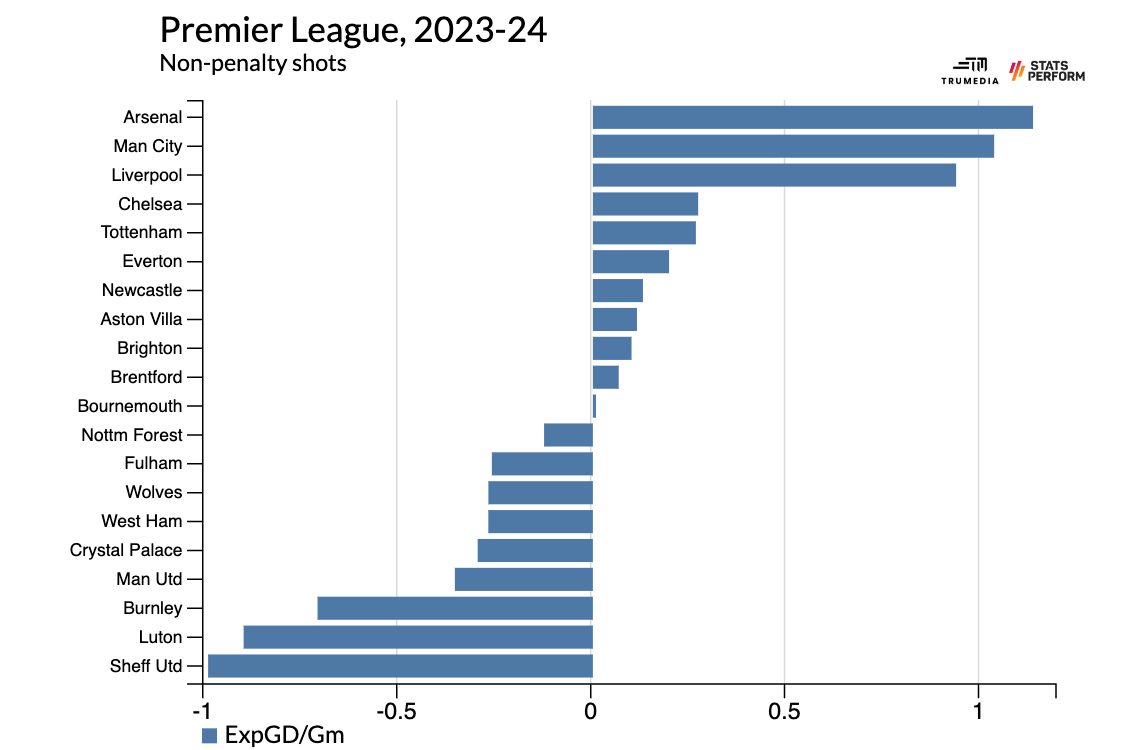
It’s borne out in the total goal differential, too:
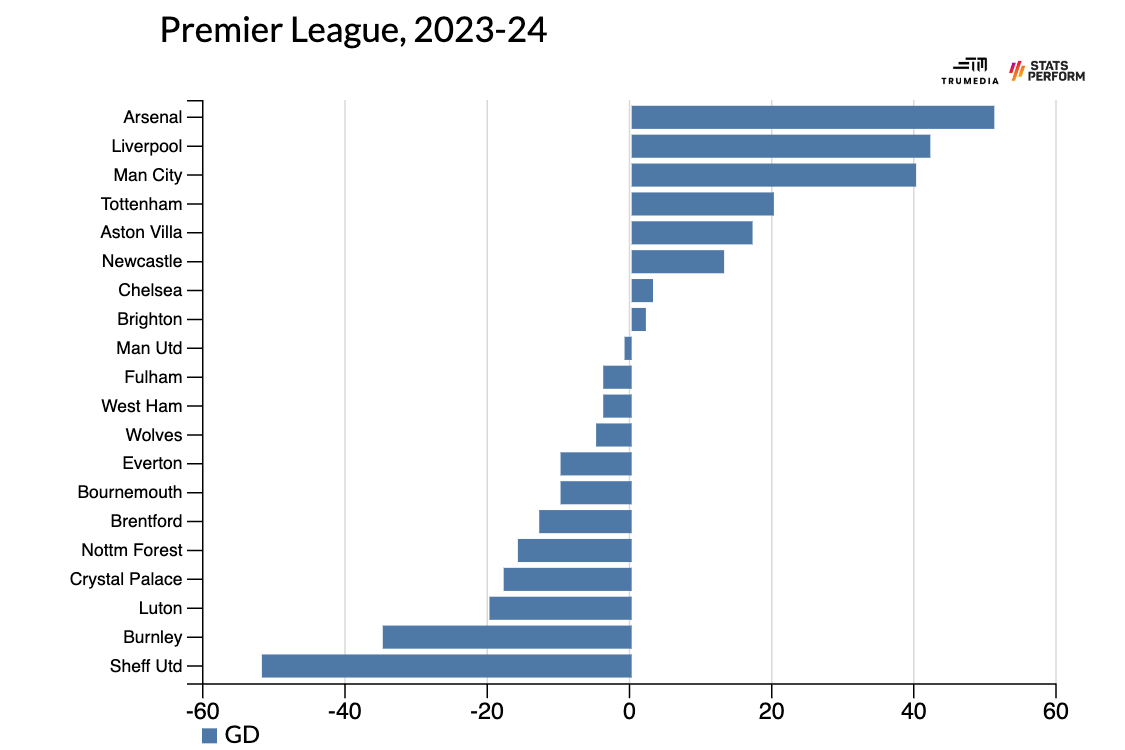
What’s more: Arsenal’s average age, weighted by minutes played, is 25.7 years. Liverpool are 27.0, while City are slightly higher at 27.3. The average age of the past 10 Premier League winners is approximately 27. So, City and Liverpool are built to win right now. Arsenal are winning right now, but they’re also built to win in the future.
The only real question mark about this team comes from their Champions League performances. They handled a very easy group, but then needed penalties to get by a Porto team who are 13 points off the pace in the Portuguese league. And then, in the first leg against a wobbling Bayern Munich in London, they conceded more expected goals than they had in any match this season:
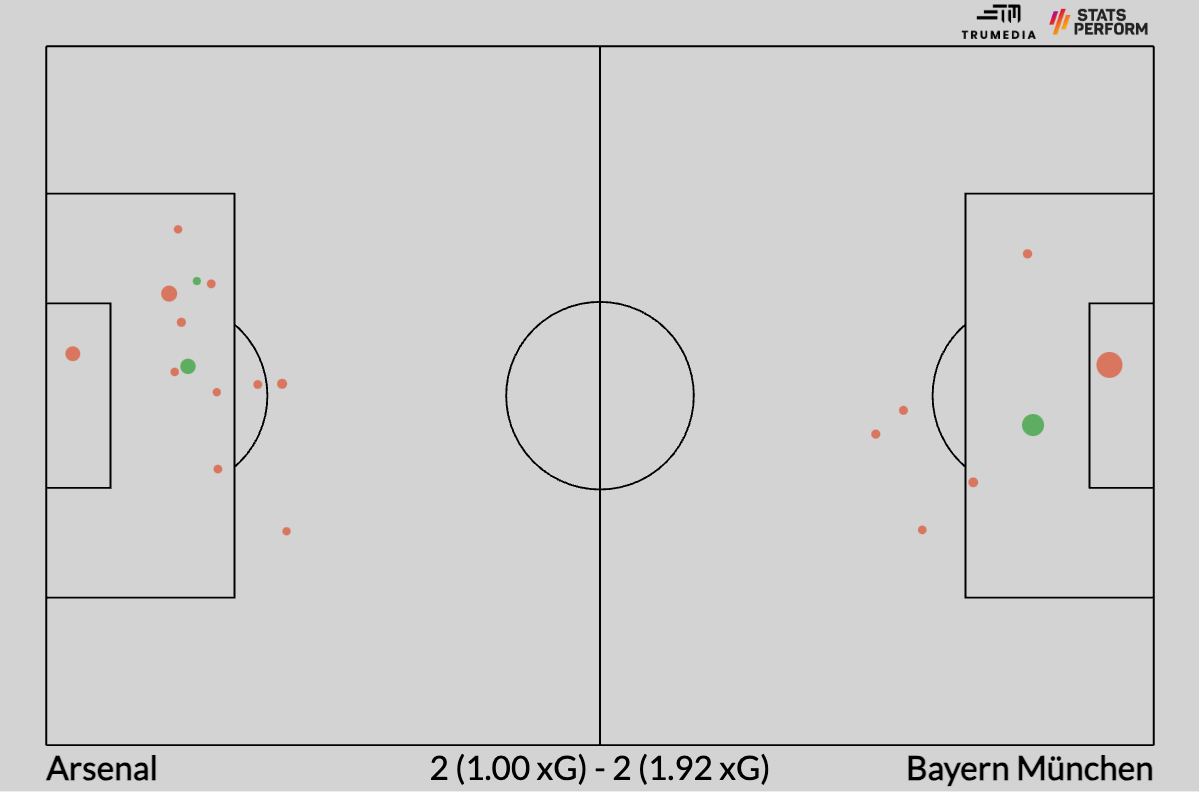
This has been the best defensive team in Europe basically since the start of the 2023-24 domestic season. The reason they’ve recovered since their stumble in December, caught both City and Liverpool while also blowing past them in goal margin is that the attack exploded right around the turn of the year.
This is their five-game rolling average for non-penalty xG created, i.e. games one through five, games two through six, and on and on:
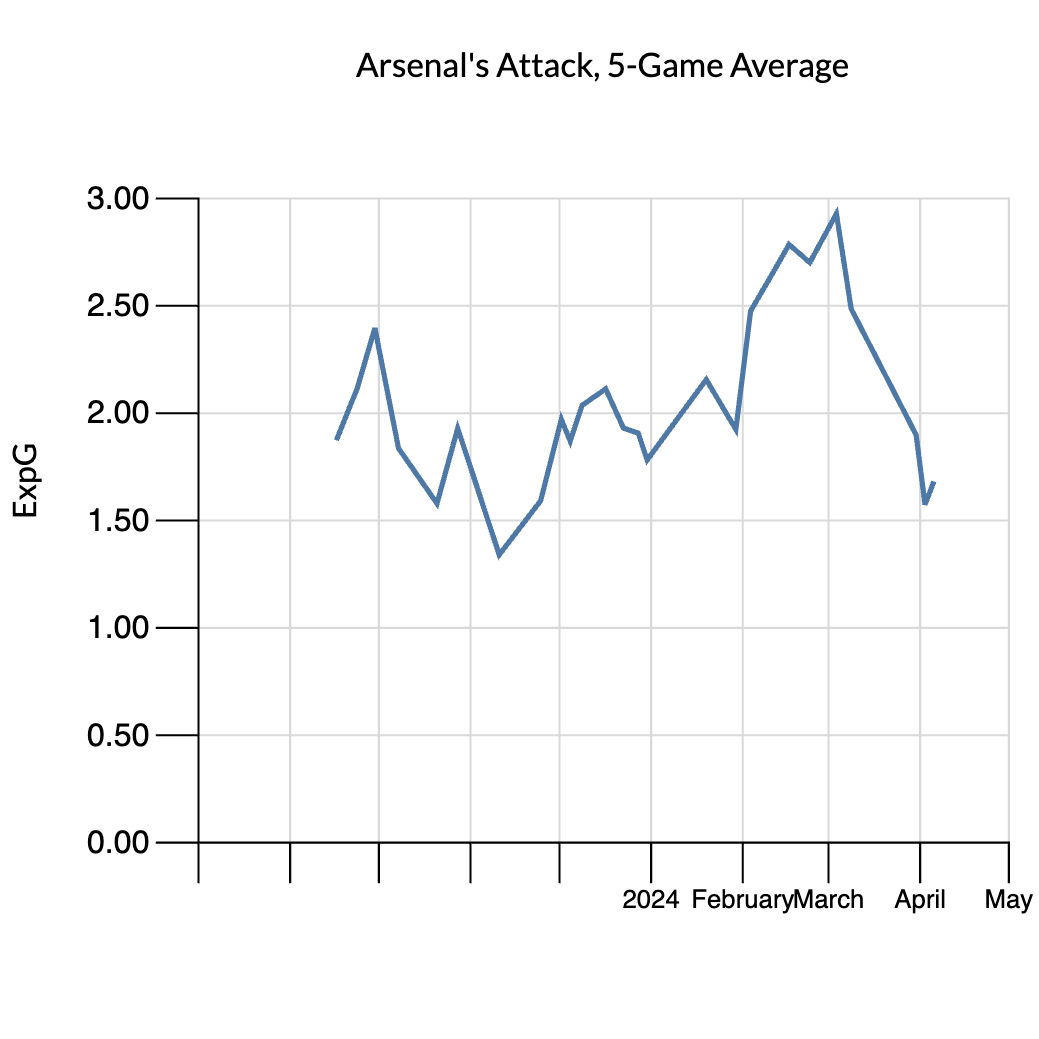
I’d been waiting for the attack to cool off because it wasn’t paired with any kind of defensive drop-off … and then I kept waiting and waiting and waiting. Now, the average has dropped off recently, but I’m not even sure I buy that. It’s because there was one game on the road against Man City, and then a game against Luton with a rotated squad where they scored two early goals and then took their foot off the gas.
The idea that a team with a forward line that includes Gabriel Jesus and Kai Havertz could be better than the one with Henry and Pires and Dennis Bergkamp just does not compute. And they do still need a signature Champions League performance to really mark their arrival at the upper-most echelon of the sport. But the Invincibles themselves were knocked out in the Champions League quarters by a significantly worse team than Arsenal’s current opponents. Plus, no one in the Premier League at the time was at the level of Liverpool or Manchester City, while the teams throughout the rest of the league weren’t able to attract the same level of player and managerial talent that they are now, either.
At a certain point, the numbers and the performances and the context just don’t lie. Bukayo Saka, Martin Odegaard, Declan Rice, William Saliba: these guys are really that good.
Now, Arsenal probably won’t win the Champions League and they probably won’t win the Premier League; that’s just how these things work when there are so many other great teams to compete against. Somebody is going to win, but the field is more likely than any individual side in either competition. But given how good Arsenal are and how young they are, it seems like only a matter of time until they win at least one, if not more, of those titles.
If this isn’t the best Arsenal team we’ve ever seen, then just wait. We’ll probably see them next year, or the year after that.
